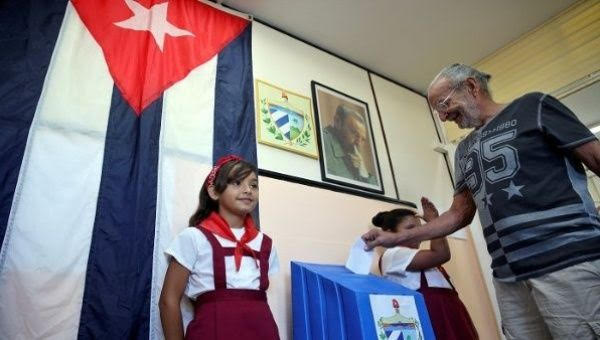On 11 March last just short of 4.7 million people—or almost 86 per cent of the registered electorate here—turned out to vote in the second and final stage of Cuba’s general election. It is noteworthy that, although well organised, supervised, and encouraged, voting is by no means obligatory.
This remarkably high rate of participation in the process was actually lower than what might have been hoped for by some, in an election where participation through presenting yourself at your local polling station is as much of a vote as marking a box to express a preference for any one candidate over another. Indeed the majority of Cubans vote for all the candidates on the ballot paper, as can legitimately be done.
Turn-out is understood to be an expression of confidence in the system of government itself; so even the slight slide in an election that will lead on 19 April to the selection of a Council of State (government) not presided over by a Castro for the first time in more than fifty years did not go unnoticed.
But with almost 95 per cent of the votes cast being valid, even a generous interpretation of the statistics for any opposition (which is by no means homogeneous or of a single or vaguely common vision) would mean that fewer than 8 per cent of those on the register indicated some degree of disaffection with Cuba’s constitutional status quo.
What government would not have the right to celebrate this after almost sixty years in office? And what disheartened imperial enemy would not wearily wonder if it will ever succeed in making any inroads in its evil endeavours to subvert the will of such a stubborn bunch of radicals as their Cuban neighbours are?
They must painfully recall at moments like this that, of the more than 650 attempts documented, their only plan to assassinate Fidel that finally succeeded was the one to wait until he died naturally and peacefully at home, at the ripe old age of ninety.
More than half of Cuba’s new parliament members will be women, more than 40 per cent will be of African or mixed-race origin, and a similar percentage will be under fifty years of age, many of whom will be sitting for a first or second term.
So there will be a very real changing of the guard here in the very near future.
Raúl Castro will be first secretary of the Communist Party of Cuba for another two years; but there is no reason to think he will use his position for anything other than offering valuable and needed support and experience to the nation’s new leadership.
It is well known that Cuba’s next president will be Miguel Díaz-Canel, at present the country’s first (i.e. principal) vice-president. He fits the exact profile of what is to be expected in a political culture where personality is a far less important factor than a perceived ability to implement and develop policy and steer a steady course.
He has a sound establishment pedigree and is known as a pragmatic progressive, with certain generally welcomed “conservative” tendencies, with the possible addition of “almost nondescript” (no better term than “safe pair of hands”) to describe him in what will be a very real political and psychological period of transition and adjustment.
When Hugo Chávez realised he had no chance of beating the aggressive cancer he had been fatally poisoned with, he drafted his Plan Patria, a blueprint for the political advancement of his Bolivarian Revolutionary project, and gave Nicolás Maduro a selective and none-too-subtle tap on the shoulder to indicate his desire that Chavistas vote him in as president to implement the policy in his absence.
The political drama is not so intense here, but the plot is not that much different.
Díaz-Canel will oversee the continuation of the Martí-inspired, Fidel-led and Raúl-maintained revolutionary socialist project that almost 86 per cent of the electorate again voted overwhelmingly for on 11 March.
I’m very much a political punter in the cheap seats who limits his bets to a safe flutter on the Tote, but my two shillings are on Díaz-Canel holding the fort for one or two five-year terms, until Gerardo Hernández Nordelo, the most senior intelligence officer of the Cuban Five and the stuff of great leadership, is ready to take his rightful place as Fidel and Raúl’s legitimate heir, as spiritual Commander and President of all Cubans (and of an Irishman in self-imposed exile here).
Time will tell.






